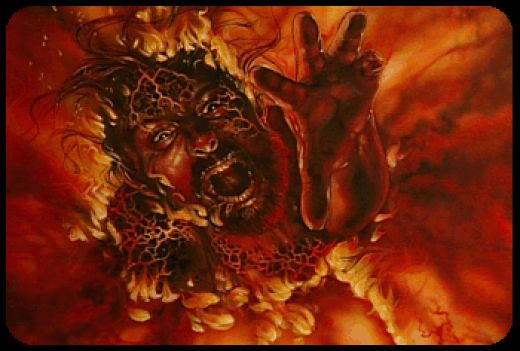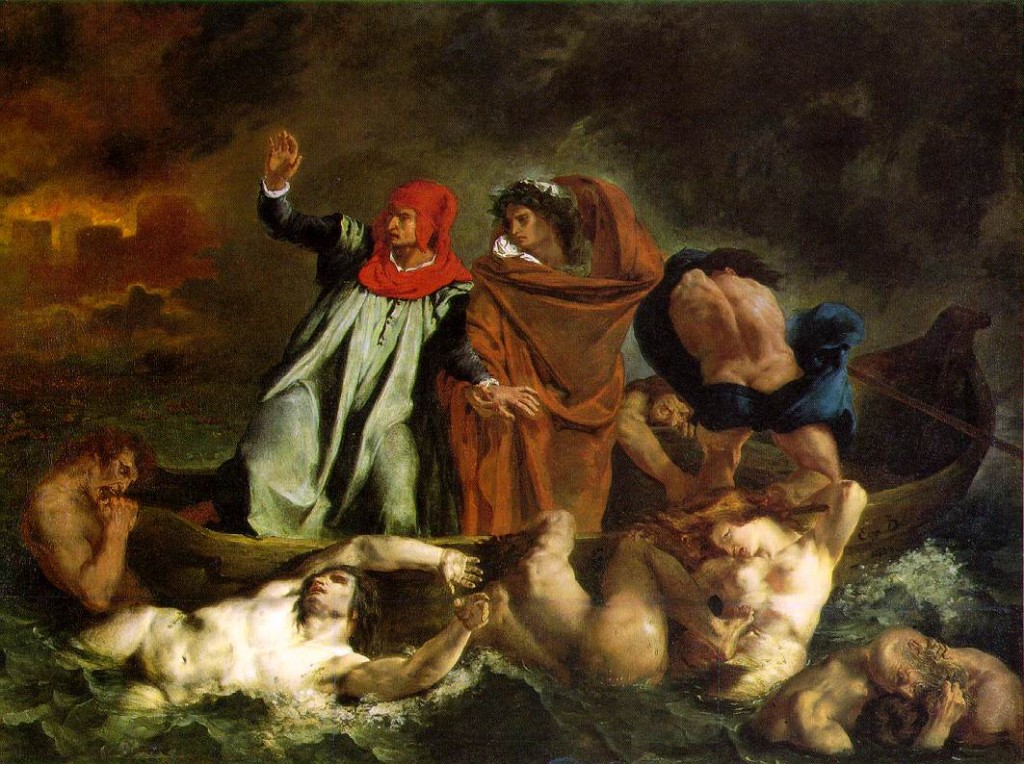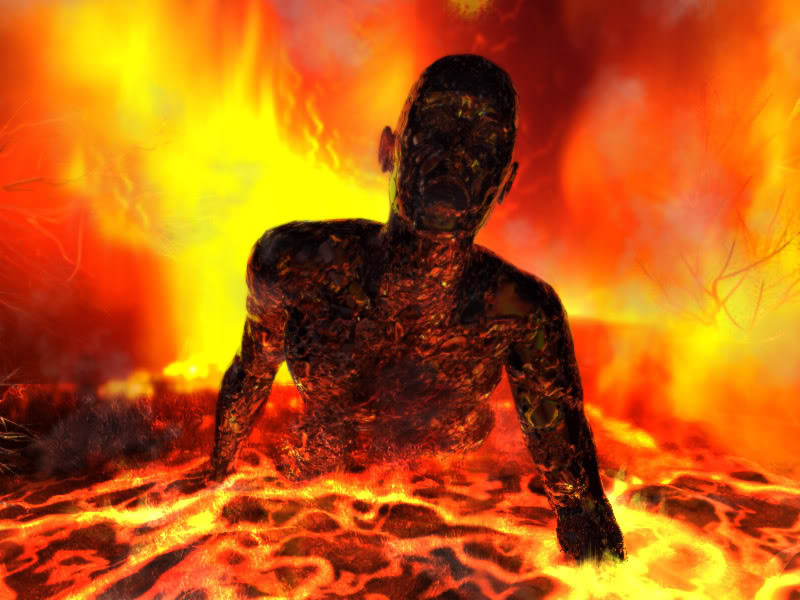The first time the word is found translated Hell in the Bible is in Deut. xxxii: 22-26 – “For a fire is kindled in mine anger, and shall burn unto the lowest Hell,Sheol—Hadees, and shall consume the earth with her increase, and set on fire the foundations of the mountains. I will heap mischiefs upon them; I will spend mine arrows upon them. They shall be burnt with hunger, and devoured with burning heat, and with bitter destruction: I will also send the teeth of beasts upon them, with the poison of serpents Of the dust. The sword without and terror within, shall destroy both the young man and the virgin, the suckling also with the man of gray hairs. I said, I would scatter them into corners, I would make the remembrance of them to cease from among men.”
“Though they dig into Hell, thence shall my hand take them; though they climb up to heaven, thence will I bring them down.” Amos ix: 2. “If I ascend up into heaven, thou art there; if I make my bed in Hell, behold, thou art there.” Ps. cxxxix: 8.
“It is as high as heaven; what canst thou do? deeper than Hell; what canst thou know.” Job xi: 8.
The sky and the depths of the earth are here placed in opposition, to represent height and depth. A place of torment after death was never thought of by any of those who use the word in the Old Testament.
If the word means a place of endless punishment, then David was a monster. Ps. lv: 15: “Let death seize upon them, and let them go down quick into Sheol—Hadees!”
Job desired to go there, xiv: 13: “Oh, that thou wouldst hide me in Sheol—Hadees.
Hezekiah expected to go there.—Isa. xxxviii: 10: “I said in the cutting off of my days, I shall go to the gates of Sheol— Hadees.
Korah, Dathan and Abiram (Numbers xvi: 30-3) not only went there “but their houses, and goods, and all that they owned,” “and the earth opened her mouth and swallowed them up, and their houses, and all the men that appertained unto Korah, and all their goods. They, and all that appertained to them, went down alive into Sheol—Hadees, and the earth closed upon them; and they perished from among the congregation.”
It i» in the dust—Job. xvii: 1C: “They shall go down to the bars of Sheol—Hadees, when our rest together is in the dust.”
It has a mouth, is in fact the grave, see Ps. cxli: 7: “Our bones are scattered at Sheol’s—Hadees’ mouth, as when one cutteth and cleaveth wood upon the earth.”
It has </ray hairs, Gen. xlii: 38: “And he said, my son shall not go down with you; for his brother is dead, and he is left alone: if mischief befall him by the way in which ye go, then shall ye bring down my gray hairs with sorrow to Sheol—Hadees.”
The overthrow of the King of Babylon is called Hell.— Isa. xiv: 9-15, 22-23: “Hell, Sheol—Hadees, from beneath is moved for thee to meet thee at thy coming; it stirreth up the dead for thee, even all the chief ones of the earth; it hath raised up from their thrones all the kings of the nations. All they shall speak and say unto thee, art thou also become weak as we? art thou become like unto us? Thy pomp is brought down to the grave, and the noise of thy viols; the worm is spread under thee, and the worms cover thee. For I will rise up against them saith the Lord of hosts, and cut off from Babylon the name, and remnant, and son, and nephew, saith the Lord. I will also make i t a possession for the bittern, and pools of water; and I will sweep it with the besom of destruction, saith the Lord of hosts.” All this imagery demonstrates temporal calamity, a national overthrow as the signification of the word Hell.
The captivity of the Jews is called Hell.—Isa. v: 13-14: “Therefore my people are gone into captivity, because they have no knowledge; and their honorable men are famished, and their multitude dried up with thirst. Therefore Sheol— Hadees, hath enlarged herself, and opened her mouth without measure; and their glory, and their multitude, and their pomp, and he that rejoiceth, shall descend into it.
Temporal overthrow is called Hell.—Ps. xlix: 14: “Like sheep they are laid in the grave, death shall feed on them; and the upright shall have dominion over them in the morning; and their beauty shall consume in Sheol—Hadees, from their dwelling.” Ezek. xxxii: 26-27: “And they shall not lie with the mighty that are fallen of the uncircumcised, which are gone down to Sheol—Hadees with their weapons of war, and they have laid their swords under their heads.” Men are in hell with their swords under their heads. This cannot mean a state of conscious suffering.
Hell is to be destroyed. Hos. xiii: 14: “Oh grave I will be thy destruction.” I Cor. xv: 55: “Oh grave I will be thy destruction.” Kev. xx: 13, 14: “And death and Hell delivered up the dead which were in them, and death and Hell were cast into the lake of fire.”
Ps. xviii: 5; xxx: 3; “O Lord,’ thou hast brought up my soul from the grave; thou hast kept me alive, that I should not go down to the pit. When the waves of death compassed me the floods of ungodly men made me afraid.” “The sorrows olHell, Sheol—Hadees compassed me about; the snares of death prevented me,” so that there is escape from Hell.”
Jonah was in a fish only seventy hours, and declared he was in hell forever. He escaped from Hell. Jon. ii: 2, 6: “Out of the belly of Hell (Sheol—Hadees) cried I, and thou heardest my voice, earth with her bars was about me forever.” Even an eternal Hell lasted but three days.
It is a place where God is, and, therefore, must be an instrumentality of mercy. Ps. cxxxix: 8: “If I make my bed in Hell (Sheol—Hadees), beheld thou art there.” Men having gone into it are redeemed from it. I Sam. ii:
6: “The Lord killeth, and maketh alive: he bringeth down to the grave (Sheol—Hadees) and bringeth up.”
Jacob unshed to go there.—Gen. xxxvii: 35: “I will go down into the grave Hades unto my son mourning.” (1)
SOURCES:
- 1878 68 page book titled, ‘The Bible Hell” By John Wesley Hanson that

Moe is the founder of GnosticWarrior.com. He is a father, husband, author, martial arts black belt, and an expert in Gnosticism, the occult, and esotericism.








